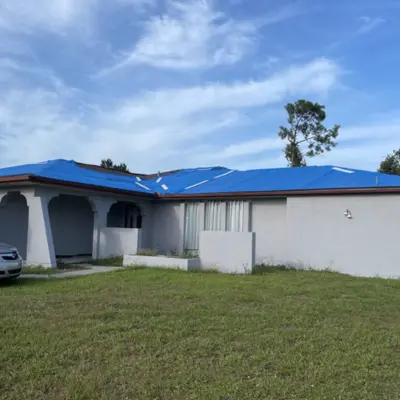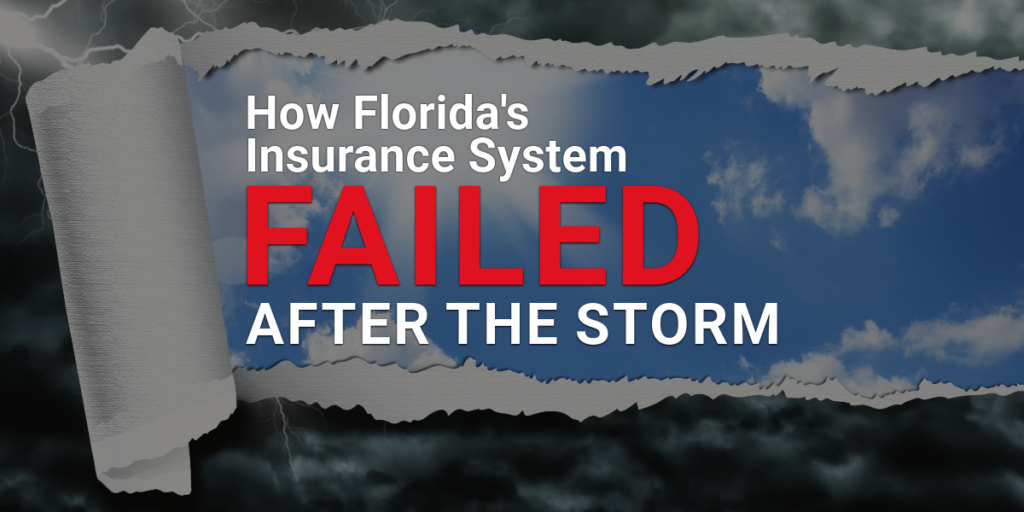Recent storms and hurricanes (including Hurricanes Ian and Idalia) in Florida caused unprecedented damage to homes. Unfortunately, after impacted homeowners filed claims, a number of insurance companies failed to deliver payouts. In fact, many companies within Florida’s insurance system suddenly became insolvent, leaving homeowners with few, if any, viable alternative solutions to address unrepaired, hazardous homes. If your recovery process has stalled, StormForce Roofing can help.
Florida’s Insurance System Explained
In the Sunshine State, hurricanes, tropical storms, tornadoes, and windstorms all function as a reality for homeowners. Of greatest concern is the threat of hurricanes, particularly during the most active season (June 1 through November 30).
For residents in high-risk coastal communities, the risk of property loss increases exponentially compared to inland regions. Florida’s insurance system often presents complex challenges for homeowners to determine what policy coverage limits exist.
Annually, Florida remains the state with the highest storm surge risk. Despite this fact, Florida does not have a hurricane insurance requirement. Typically, however, a hurricane is covered under most carriers, thus not requiring a separate policy.
Flash flooding often accompanies hurricanes or tropical storms. Unfortunately, an alarming number of the highest-rated homeowners insurance providers do not include water damage from floods. Homeowners must purchase flood insurance separately to achieve coverage.
The Florida Office of Insurance Regulation (FLOIR) oversees the insurance system. Within that scope, FLOIR requires insurers to offer homeowners with specific deductible amounts: $500, 2%, 5%, or 10% for Hurricane Deductibles. Percentages use the home’s total insured value.
How Florida’s Insurance System Is Failing Homeowners

In Florida, many experts believe that insurance companies have substantial leeway in relation to regulatory standards. Consequently, lightly enforced regulations permit smaller or less established insurance providers an opportunity to selectively choose what coverage they extend and how many funds they reserve. In addition, many legal advisors, consumer advocacy groups, and those involved within the insurance market in Florida are of the opinion that certain insurance companies intentionally employ deceptive or underhanded tactics that deny, delay, or underpay homeowners following a weather disaster.
Without keen oversight, many insurance providers skirt regulatory guidelines and avoid accountability for participating in practices that do not promote the best interests of homeowners. Unfortunately, homeowners bear the brunt of the loss when insurance companies become insolvent due to financial troubles. Additionally, the state-run Florida Insurance Guaranty Association only has so much ability to resolve claims from homeowners insured by insolvent or troubled insurance providers.
Levying an emergency assessment on residents statewide typically results when the state does not have available emergency funds to pay aggrieved homeowners. All homeowners (including ones insured by established and reputable insurance providers) may end up feeling the pinch of increased insurance premiums and less attractive policy terms to continue accessing the same coverage. Many homeowners think they have no choice but to accept the results of an irresponsibly-managed industry.
To further exasperate the issue in Florida, more often than not, executives and influential stakeholders in failing or insolvent insurance companies can actually profit substantially personally from their involvement before disastrous weather events occur. When insurance companies are not facing substantial volumes of claims, they may often fail to establish sufficient reserves to ensure all insured parties receive payouts. This practice can reflect poorly on the insurance industry and state regulatory agencies.
What Homeowners Can Do To Protect Themselves
A savvy homeowner should understand that not everyone prioritizes the best interests of homeowners. For example, insurance companies have, in the past, disputed or denied valid claims for unclear or unexplained reasons. But homeowners can take reasonable steps to protect themselves before the next storm. Following a storm, homeowners have viable options to improve the likelihood of a successful resolution. Take the following factors into consideration when evaluating what options exist:
- Facilitate a comprehensive home inspection.
Involving an expert home inspector to investigate and assess areas for improvement allows the homeowner an opportunity to address potential issues.
- Involve a consumer protection agency.
Nonprofit watchdog agencies, including the American Policyholder Association, work with homeowners to contact regulators and assist with claim resolution.
- Proactively stormproof the home.
Strengthen the roof. Reinforce doors. Upgrade to high-impact windows. Install gutters. Homeowners have many ways to reduce the adverse impact of storms.
- Select a reputable insurance carrier.
Homeowners need to perform their due diligence. Most insurance providers that fail lack an established record of remaining solvent through periods of difficulty.
- Verify that insurance coverage is sufficient.
82% of Florida residents do not have flood insurance. Many homeowners need help understanding coverage limits. Work with an agent to know policy terms.
- Work with local legislators to enact change.
Florida’s legislative branch is responsible for passing laws that regulate the insurance industry in a way that operates in the best interests of consumers.
StormForce Roofing of Jacksonville, FL, is here for you and your family. Following a storm, we partner with you to customize an individually designed plan to restore your home’s roof wholly and efficiently. No matter the circumstance, we remain committed to ethical and transparent business practices that protect and promote your best interests. We guarantee your satisfaction by using only the very finest materials and highest quality workmanship. Contact us today to schedule a free consultation.
Author’s note: The information contained in this article is for general educational information only. This information does not constitute legal advice, shall not serve as a recommendation on any insurance-related claims, and is not intended to promote, influence, encourage, or instruct any property owner to pursue an insurance claim. This article shall not serve as a solicitation for any specific service provided by StormForce. Our company is licensed as a Florida Certified Roofing Contractor with services limited to the construction, repair, and replacement of roofing systems. StormForce does not perform, and has not offered to perform, any services relating to home inspection, public adjusting, the sale of insurance products or policies, or legal representation. The links and data contained within this article are for educational reference only, and StormForce does not endorse any specific non-profit organization, consumer protection entity, or government agency. Links to government websites are accessible as public records, and StormForce makes no claim or representation as to the original government works or publications.
